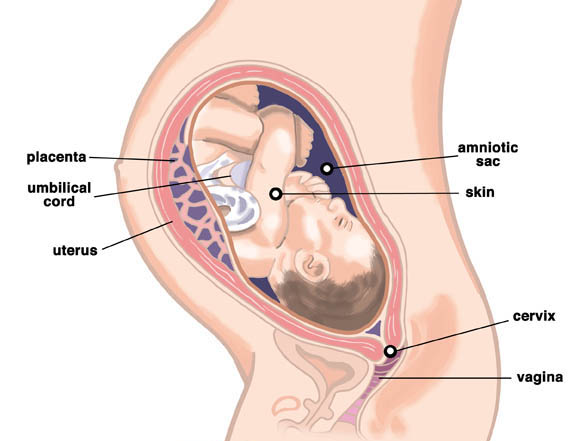41 and 42 Weeks Pregnant
Related Articles
External Links
- This article has no external links.
Your baby at 41-42 weeks
Still enjoying the snug comfort of your uterus, your little one hasn't decided to make themselves present in the outside world yet. As comfortable as he or she may be, you are probably feeling the complete opposite! There is nothing wrong with going overdue; the baby's growth has most likely stopped, or slowed a lot so don't worry that an overdue pregnancy means that you will be delivering a huge baby. Many pregnancies last up to 42 weeks. This is probably due to the estimated due date being incorrect. Occasionally, a baby arrives late because it is truly overdue (postmature), and you will be able to tell if this is the case as the baby's skin will be quite dry and cracked, or wrinkled. This is because the vernix that was protecting the skin from the amniotic fluid will have been shed some time beforehand, in anticipation of an earlier labour. Postmature babies don't usually have any serious problems, but the practitioner will probably monitor them closely during the early days following their arrival just to be sure.

How you are feeling
One thing is for sure: very soon you will finally meet the baby that you have carried, nurtured and protected for the last 9 (and a bit!) months. The chances are that, despite all your anxieties and fears, you are ready to carry this baby in your arms rather than in your tummy. You may have noticed that in the past couple of weeks your weight has stopped increasing. In fact, it may have actually decreased slightly. It is perfectly normal for women to lose between 0.5 and 1.5kg in the last month of pregnancy. It is also likely that you will have experienced a recent change in energy levels, either up or down, and perhaps that 'nesting' instinct has set in at last and you've found yourself cleaning every nook and cranny in the house with a toothbrush! If you are finding yourself feeling disillusioned by the extended wait, keep a look out for signs that labour is on its way, such as the loss of your mucous plug - this is has been sealing the opening of the uterus and usually gets passed through the uterus 1-2 weeks before labour or sometimes just as labour starts. Other symptoms include a pink or bloody show, diarrhoea and increased Braxton Hicks contractions.
What you need to do
At 41 weeks you will have another antenatal appointment. As with most of your previous appointments, the doctor or midwife will perform checks on the size of your abdomen as well as measuring your blood pressure and testing for signs of protein in your urine. There is an increased risk of stillbirth in pregnancies over 42 weeks, so from 40 weeks methods of induction (artificially starting labour) will begin to be implemented. Initially you will be offered a 'membrane sweep'. This is a manual process in which your midwife separates your membranes from your cervix. In response, your body will then release hormones (prostaglandins) which can initiate labour. The process can be uncomfortable and even a little bit painful. You will find it easier if you try some of the breathing and relaxation exercises that you have been taught to use during labour. You will be offered up to 3 membrane sweeps before further methods of induction are used.
If you want to try to encourage labour yourself then there are safe ways of doing so, but be careful what you read as there are also a number of old wives' tales that could be very damaging to your health. Safe and healthy ways of kick-starting labour yourself include walking and sex. Yes, while sex is most probably the last thing on your mind right now, the contractions of your uterus brought about by an orgasm are thought to help bring on labour for some women. Many women also swear by eating fresh pineapple and drinking raspberry leaf tea. However, whether they are in common use or not, herbal remedies have not been proven to be absolutely safe during pregnancy so always consult your midwife or GP first. Drinking castor oil is strongly advised against as it will cause vomiting and diarrhoea, which can lead to dehydration.
| << 40 Weeks Pregnant |